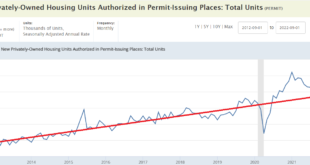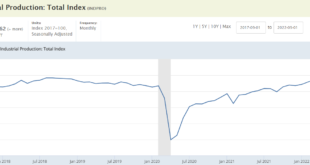from Peter Söderbaum and WEA Commentaries current issue Introduction In all societies there is a tension between democracy and dictatorship. In some countries democracy is well institutionalized and the threat of dictatorship is successfully kept at a distance. In other societies, a system close to dictatorship is quite established and democracy is regarded as a threat. Today, we witness a confrontation between Russia, a nation close to dictatorship and Ukraine which appears to move...
Read More »Housing permits and starts, GDP forecast
Permits back on trend after a post-Covid bounce? Starts down a bit but perhaps leveling off around pre covid levels. Certainly not a major collapse yet: Multi-family doing better than single-family: Another tick up in the Fed Atlanta’s GDP calculations:
Read More »Housing permits and starts, GDP forecast
Permits back on trend after a post-Covid bounce? Starts down a bit but perhaps leveling off around pre covid levels. Certainly not a major collapse yet: Multi-family doing better than single-family: Another tick up in the Fed Atlanta’s GDP calculations:
Read More »The Nobel prize in economics — awarding popular misconceptions
from Lars Syll This year’s Sveriges Riksbank Prize in Economic Sciences in Memory of Alfred Nobel honours Ben Bernanke, Douglas Diamond and Philip Dybvig. In the view of the Royal Swedish Academy of Sciences, the laureates ‘have significantly improved our understanding of the role of banks in the economy’. But what is the role of banks in the economy? The academy describes it this way: ‘To understand why a banking crisis can have such enormous consequences for society, we need to know...
Read More »Industrial production, EU trade, miles driven
No sign here that the rate hikes have slowed growth: This is what has been hurting their currency: This series is showing signs of slowing, perhaps due to working from home:
Read More »Industrial production, EU trade, miles driven
No sign here that the rate hikes have slowed growth: This is what has been hurting their currency: This series is showing signs of slowing, perhaps due to working from home:
Read More »Open thread October 18, 2022
What is money?
from Tony Lawson and real-world economics review issue no. 101 What is money? Two sorts of answer to this question can be found in the modern literature. One locates money’s nature in the organising structure of human communities, the other in intrinsic properties of particular (money) items (like commodities, debts, precious metals and so on). If accounts of money that draw on social positioning theory are instances of the former, a currently very popular and seemingly increasingly...
Read More »Capitalism without capital doesn’t work
The future of the information (non) economy For quite a while now, I’ve been making the argument that, in an information economy, the relationship between investment, production and profit, central to capitalism, no longer works. Here’s an early statement from my Giblin lecture in 2005. to the extent that innovation and productive growth arise fromactivities that are pursued primarily on the basis non-economic motives, the linkbetween incentives and outcomes is weakened. This...
Read More »Capitalism without capital doesn’t work
The future of the information (non) economy For quite a while now, I’ve been making the argument that, in an information economy, the relationship between investment, production and profit, central to capitalism, no longer works. Here’s an early statement from my Giblin lecture in 2005. to the extent that innovation and productive growth arise fromactivities that are pursued primarily on the basis non-economic motives, the linkbetween incentives and outcomes is weakened. This...
Read More » Heterodox
Heterodox





